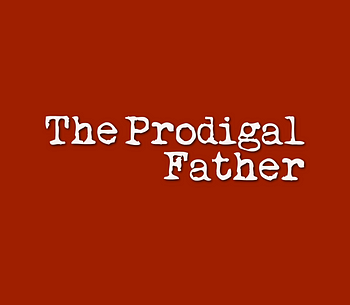The Prodigal Father.

If you’ve read the Gospels, you’re familiar with the story of the Prodigal Son.
A guy asks his dad for his share of his father’s inheritance. He blows it all on wine, women, and song. Broke and hopeless, he finds himself feeding pigs and trying to sneak some pig slop for himself. He returns to his father to humbly beg for forgiveness. His dad sees him coming, runs to meet him, and ecstatically throws a party, because his son, who he presumed to be dead, is alive. His son, who was lost, is now found.
A touching story about a son who learns a valuable lesson, right?
Wrong.
You see, this story isn’t about the Prodigal Son at all. It’s about the Prodigal Father.
Most readers of this story assume that the word prodigal refers to being lost, to being distant, or to running away. Not so. A quick consultation with a dictionary (remember those antiquated things?) reveals the true, beautiful meaning of the word. “Wastefully or recklessly extravagant; giving or yielding profusely; lavish.”
Yes, the son was reckless with his father’s money. Yes, he squandered it all. Yes, he should have invested in real estate, opened a Roth IRA, and maybe even bought a pig farm. He didn’t. He blew it, wounding his father in the process.
But the real recklessness, the real extravagance found in this story? It’s the effusive grace of the father. He gave everything, knowing it would cost him everything. He lavishly gave his son the money he asked for, even though he knew his son would waste it all. He recklessly looked down the road in front of his house daily, hoping against hope that his son would come home. He audaciously forgave his son’s wrongdoings, and freely forgot. He wastefully gave his finest clothes and his fatted calf to celebrate his son’s return. “We must celebrate with a feast,” he said, “for this son of mine was dead and has now returned to life. He was lost, but now he is found.” So the party began.
We have all wasted our talents, our time, our money, our love. That’s the part that makes sense. We’re human; we’re imperfect; we’re lost. We all find ourselves far from home, far from love.
What doesn’t make sense is what happens next.
The Father doesn’t wait for us to come to him. He runs to meet us, recklessly lavishing us with grace that we don’t even come close to deserving.
“See what great love the Father has lavished on us,” John writes, “that we should be called children of God!” Children. Not servants, not slaves, not subordinates. Children. The objects of his affection. The recipients of his inheritance. Made to be like him; made to be with him.
Think you’re as far from the Father as you can get? Think again. He’s running towards you.
Every other god in every other religion teaches, in some form, that we need to earn grace, that we need to work for our salvation. Not so with Jesus. He’s done everything. All we have to do? Believe. When we accept this love we don’t deserve, we will want to love the Father, and all of his other children, the way he loves us. Unselfishly. Recklessly. Lavishly. We’re free to give of the grace we’ve been given.
William B. Miller, author of The Beer Drinker’s Guide To God, puts it like this: “One extravagant, undeserved gesture can make a lifetime of difference. One tiny sip of intoxicating grace can send us stumbling toward a lifetime of sharing.”
Christianity, and Christians, have done much to cloud these simple truths. Whether through legalism, or fanaticism, or judgmentalism, or any number of other isms, we have done our best to distort, and distract from, this clear picture of amazing grace.
But underneath it all, the truth remains. Strip away the Westboro Baptist Church, the Crusades, and Donald Trump’s concept of forgiveness. Strip away all of our attempts to earn God’s favor, to judge others who aren’t like us, and to think we have a corner on the truth. Strip away all our misrepresentations of who God is, and underneath it all you will find a Father who can’t wait for you to come to him, but instead is recklessly running toward you, arms open wide.
He has given everything to be with you, whether you believe in him or not. He wants to spend forever with you in a place with no more pain, no more death, no more sin. All he wants is to lavish you with his reckless, extravagant love.
He is the Prodigal Father.
